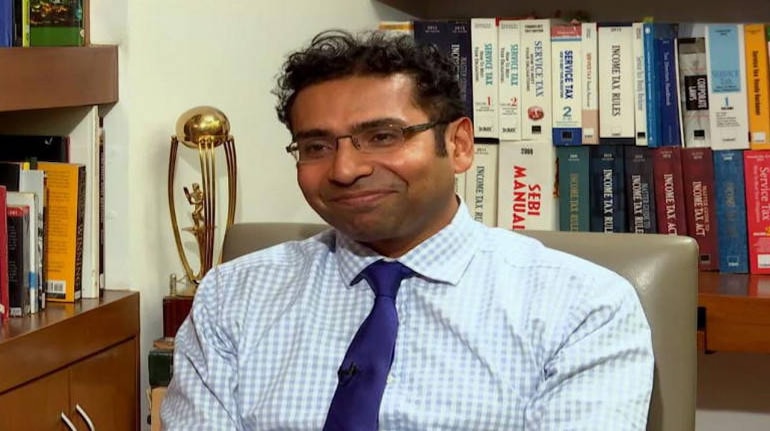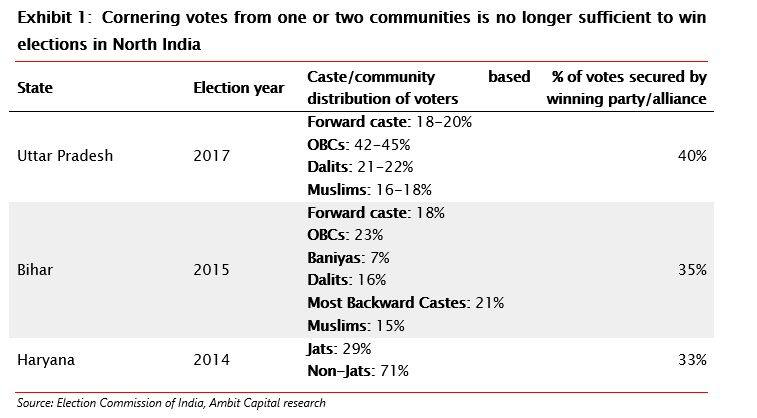
Ruling North India is a necessity for success in Pan-Indian politics. In Independent India, until Narendra Modi arrived, no politician from outside Hindi cow belt (with the notable exception of PV Narasimha Rao) had been Prime Minister for a full term.
There is a reason for this – the Hindi speaking Indian states account of 226 of 543 (42 percent) seats in the Lok Sabha. Therefore, a politician who is able to build a voter base in the Hindi cow belt has a much higher probability of being the PM than a leader from any other region.
For the first time, North India does not have a political giant. Modi’s dominance of Indian politics has been made possible, in part, due to the absence of a powerhouse politician from the Hindi speaking belt.
JL Nehru, Indira Gandhi, and Rajiv Gandhi – each of the members of this dynasty were until their death by far the most commanding figure in North Indian politics and that gave them the keys to all of India.
Rajiv’s assassination in 1991, opened the door for the rise of the BJP led by two leaders who were popular in the Hindi speaking belt – Atal Bihari Vajpayee and Lal Krishna Advani.
The BJP (or NDA’s) loss in the 2004 General Election then created a decade in which regional North Indian leaders like Mulayam Singh Yadav and Nitish Kumar tried to give vent to their national aspirations but Sonia Gandhi just about managed to cling on to power.
Now with Mulayam, Sonia and Lalu Prasad Yadav ageing, with their progeny yet to find their political feet, with Nitish Kumar subdued in Bihar and with the BJP Chief Ministers in Rajasthan, MP, Chattisgarh and UP contained in their states for now, for the first time since Independence, we have the strange situation that there is no North Indian political giant setting the agenda in Indian politics. Why is this?
In the 1990s and the noughties, with the Congress’ popularity flagging, North Indian politicians from all parties created voter bases on the basis of caste and/or religion.
For 20 years (roughly from 1992 to the 2G spectrum scam in 2010) this worked reasonably well – a leader would hoover up, say, the Jat vote in a constituency and thus corner 15-20 percent of the votes in that race.
He would then get a smattering of votes from other castes and thus with 25 percent of the votes, he would win the seat in a fragmented First Past the Post race.
Starting with the UP Assembly elections of 2013 (where the SP crushed the BSP and the Congress), it became evident that this construct no longer works.
What we are repeatedly seeing in North Indian elections now, is that cornering the votes of one or two communities is no longer sufficient to win the race (see exhibit below).

The results of the recent elections suggest that the older construct - of dominant regional parties controlled by a strong single caste/community-based leader - is on the retreat.
These regional parties used to cling on to a specific voter base (based on caste, community etc.) and thrive. Now, however, as shown in the section above, support from a single vote bank is not going to help win elections anymore.
The absence of a North Indian political giant has major implications for India
North India has been for at least a decade now a laggard in creating jobs and economic prosperity. An average person in northern India earns a per capita income of USD 1,183 (which is less than that earned by an average citizen of Pakistan or Bangladesh) whilst an average person in South India earns a per capita income of US$2,014.
Moreover, youth employment rate is much higher in South India (56%) than in North India (47%). Furthermore, the female: male ratio continues to deteriorate in the North.
The gender ratio for northern India is 901 females per 1000 males as compared to 994 females per 1000 males for South India and the fertility rate simply refuses to fall as much in the North as it has done in the South and in the West of the country.
The fertility rate in North India is 2.4 compared to 1.8 for South India. With low-quality education, North India’s youth are heading into a future where they have few jobs and few women to contend with.
With the political situation in the North being in flux, social unrest is on the rise across the North India as evidenced by both a rise in: (a) what is known as routine crime in India (robbery, rape and civic violence as seen in the farmers’ agitation in Madhya Pradesh earlier this year and in Haryana last year); and (b) in hate crime.
As per a report in India spend, “Muslims were the target of 51% of violence centred on bovine issues over nearly eight years (2010 to 2017) and comprised 86% of 28 Indians killed in 63 incidents."
In the coming decade, the odds are in favour of these three dynamics – a weak economy, a retrograde social milieu and lack of political leadership – ravaging the North.
Disclaimer: The author is Saurabh Mukherjea, CEO of Ambit Capital and the author of “The Unusual Billionaires”. The views expressed are personal. The views and investment tips expressed by the expert on moneycontrol.com are his own, and not that of the website or its management.
Discover the latest business news, Sensex, and Nifty updates. Obtain Personal Finance insights, tax queries, and expert opinions on Moneycontrol or download the Moneycontrol App to stay updated!